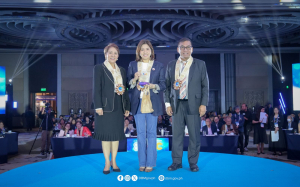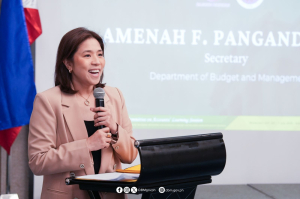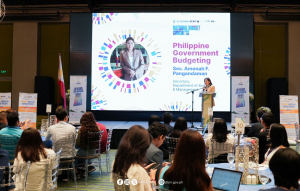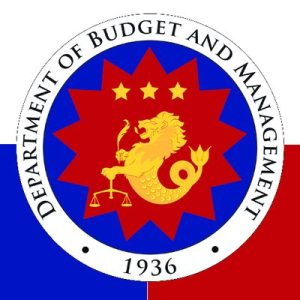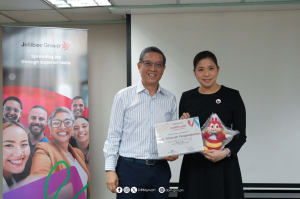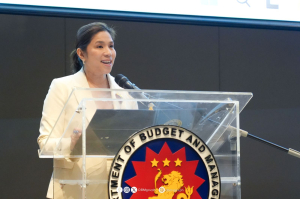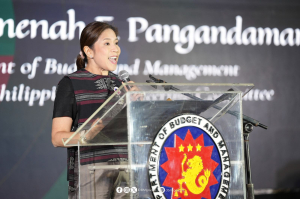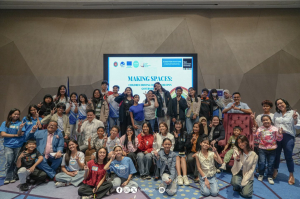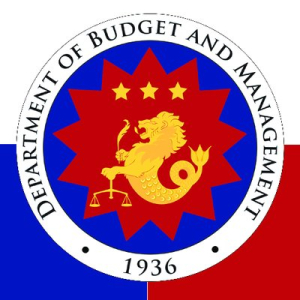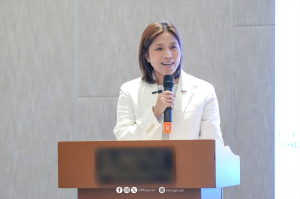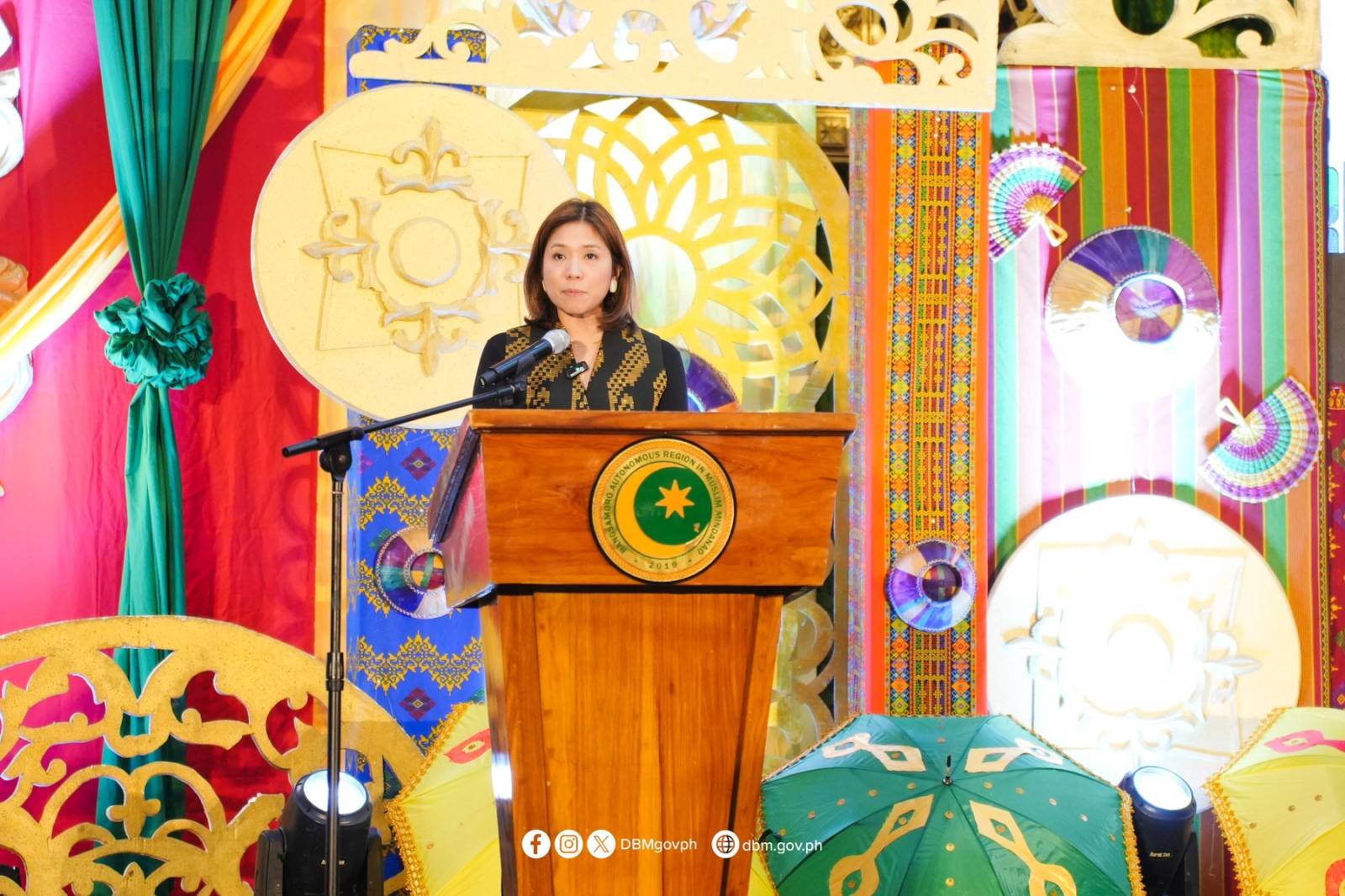
- Details

Isang maganda at pinagpalang araw po sa ating lahat!
Hindi po lingid sa kaalaman ng mga nandidito na ako po ay isang taas-noong tubong Mindanao. Ako po ay isang Maranao, kung kaya naman, ako rin po ay anak ng BARMM. So please allow me to begin by saying, Assalamu alaikum wa Raḥmatullahi wa Barakatuh.
Allow me to also acknowledge the presence of Rt. Hon. Lord Jack McConnell of Glenscorrodale, former First Minister of Scotland, member of the UK House of Lords, and expert adviser of Westminster Foundation for Democracy, extending to us the UK government’s commitment to the Bangsamoro peacebuilding.
Secondly, I would like to express my sincerest gratitude to everyone who made this purposeful advocacy campaign possible through their invaluable support:
- our very own DBM Regional Office XII headed by no less than Director Akmad J. Usman;
- our colleagues from BARMM—Chief Minister Ahod Balawag Ebrahim, Ministry of Finance, and Budget and Management Minister Ubaida Pacasem, Ministry of Interior and Local Government Minister Sha Elijah Dumama-Alba, and the Office of the Chief Minister–Bangsamoro Information Office;
- the Local Government of Cotabato City led by Mayor Mohammad Ali “Bruce” Matabalao;
- my fellow Maranao, Associate Justice Japar B. Dimaampao;
- the Consortium of Bangsamoro Civil Society, represented by Mr. Zalave Dinas, and our partners from the Civil Society Organizations;
- our fellow public servants, and of course, our dear participants.
We ended last year’s run of OGPinas in Davao City, and I couldn’t be happier to be back in my beloved land of promise, now in BARMM, to kickstart the year—only two months since I expressed my hope to also bring OGPinas here—a testament to the hard work and commitment of the DBM to empowering BARMM. And a true testament to our strong relationship with BARMM. To the BARMM ministers who have supported this event, once again, maraming, maraming salamat po! Shukran.
Definitely, we have a lot of reasons to celebrate including this momentous collaboration between the BARMM, DBM, and PH-OGP sharing the common desire to bring the government closer to the people.
Most of all, we are truly blessed because we are also commemorating the 5th Founding Anniversary of BARMM this week. As Co-Chair of the Intergovernmental Relations Body working very hard on the development of BARMM, this truly warms my heart and means a lot to me.
Back to OGP—Alam po ba ninyo na ang Pilipinas ay isa sa walong bansang nagtatag o founding member ng Open Government Partnership o OGP? And it was only under the Administration of President Ferdinand R. Marcos Jr., through the issuance of Executive Order No. 31 last June 2023, that we have institutionalized the Philippine Open Government Partnership (PH-OGP).
In line with this EO, we have brought the OGPinas! National Advocacy Campaign to different strategic locations around the country—from Luzon to the Visayas, and Mindanao—in pursuit of strengthened public participation in policy-making and governance.
Sa pag-iikot po namin sa iba’t ibang bahagi ng Pilipinas, nakita ko po na napakaraming magagaling at matutuwid na mga local officials na nagsusulong ng open government o bukas na pamamahala sa kanilang mga nasasakupan. At higit na mas marami po ang ating mga kababayan na nagpakita ng kanilang pakiki-isa sa ating adbokasiya. Gaya po ng sinabi ng Chief Executive Officer ng Open Government Partnership na si Sanjay Pradhan noong nakaraang OGP Global Summit sa Tallinn, Estonia, ang open government ay talagang nasa dugo nating mga Pilipino—at ang OGPinas! ay matibay na patunay nito.
Hindi lamang po dahil ako ay isang Mindanaoan ngunit dahil na rin sa aking mga personal na karanasan at pakikisalamuha sa ating mga kapatid dito sa BARMM, alam ko pong napakalaki ng ating pagpapahalaga sa good governance.
In fact, one of the principles that the Bangsamoro Administrative Code adheres to is that, in pursuit of moral governance, the Bangsamoro Government shall maintain honesty, integrity, transparency, accountability, and participation in governance; and take positive and effective measures against graft and corruption.
Indeed, we must make the call for open government and good governance stronger and louder here in Mindanao and in BARMM. Marami na po tayong pinagdaanan para makamit ang kapayapaang ating tinatamasa sa kasalukuyan. At ngayon, kailangan naman natin ang open government upang mapangalagaan at lalong mabigyang halaga ang tinatamasang kapayapaang ito.
Kaakibat po ng peacebuilding process ang pagsiguro na ang ating mga kapatid at kababayan sa Mindanao ay makaahon sa kahirapang bunga ng ilang taong labanan. As such, I firmly believe that peacebuilding and socioeconomic recovery will be sooner achieved if we invest in inclusive, responsive, and accountable governance systems. We need to establish public trust in our institutions that will strengthen our commitment to carry our people forward into a peaceful future.
And this is what Bagong Pilipinas is all about—the new tagline of the administration—shaping a government that is truly responsive to the needs of the people; one that is visionary and accountable to its constituents; and one that fulfills its promise of prosperity for everyone, including the future generations.
At this point, I would also like to take this opportunity to congratulate BARMM and its Government of the Day for having its Fiscal Year (FY) 2024 budget approved on December 21 of last year—just one day after President Ferdinand R. Marcos Jr. signed the FY 2024 General Appropriations Act.
Bilang Budget Secretary, ako po ay lubos na naniniwala na ang budget ang pinaka-daan upang maiparating natin sa ating mga kababayan na tayo ay tapat sa ating pangako na tayo ay tutugon sa kanilang pangangailangan.
Actually, PH-OGP is not new to Mindanao since the Province of South Cotabato joined the OGP Local Program in 2018, and has since crafted complementing local laws and resolutions that strengthen participatory governance. In fact, Governor Reynaldo Tamayo Jr. was with us during the OGP Global Summit. I hope that South Cotabato will inspire all provinces in Mindanao, and even BARMM, to embrace open government as they have.
We also recognize the significant contribution of our Civil Society Organizations, People’s Organizations, and movements at the grassroots level in pushing for peace in Mindanao so I want to emphasize that this Open Government movement, OGPinas, is for you—so that we can dialogue and work together towards transforming Mindanao from a land of promise to a land of promises fulfilled.
To my fellow Mindanaoans, please maximize this opportunity. Ako po ay lubos na umaasa na ito po ang magiging simula ng pagyakap ng BARMM sa PH-OGP.
I have always said that it is my dream to see a BARMM that is thriving and a Mindanao that shines as a land of promise—and I am confident that this dream will turn into reality through open government and good governance.
Hence, I call on each of you to join us in achieving our vision for an open government, and let us empower others through this platform to make the changes we all desire for lasting peace and prosperity in Mindanao—tungo sa Bagong Pilipinas kung saan walang Pilipino ang maiiwanan, at kung saan ang gobyerno at mamamayan ay nagtutulungan at nagkakaunawaan.
Muli, Happy 5th BARMM Founding Anniversary! Mabuhay po tayong lahat. Mabuhay ang BARMM at ang OGPinas!
Maraming salamat po. Wabillahi Tawfiq Wal Hidaya, Wasalamu alaikum wa rahmatullahi wa Barakatuhu.

- Details

To our colleagues in the government, partners from the academe, as well as private and civil society organizations, cyber experts and the rest of the cybersecurity community, and our dear participants, a pleasant afternoon to all.
Assalamu alaikum wa Raḥmatullahi wa Barakatuh.
I am honored to deliver this keynote for the second day of this very timely and relevant two-day conference. As you may all know, the Administration of President Ferdinand R. Marcos Jr. puts a premium on the country’s digital transformation as a means to achieve our national development goals.
In his latest State of the Nation Address, PBBM underscored that “digitalization is the call of today” and that the “government must fully embrace digitalization to provide better service to the people.” In June of last year, PBBM also signed Executive Order No. 29, propelling our digital transformation advocacy forward by directing the full adoption of the Integrated Financial Management Information System (IFMIS) in government agencies to improve bureaucratic efficiency and ensure the efficient delivery of quality services to the public.
Indeed, it is our responsibility to maximize the transformative potential of digital technology to ensure greater efficiency in the delivery of public services and ultimately uplift the lives of our fellow Filipinos. Thus, we, at the Department of Budget and Management (DBM), are moving full speed ahead in digitally transforming our bureaucracy and our country.
Towards this mission, the Department of Information and Communications Technology (DICT) will receive a total of Php 6.9 billion budget for new appropriations under the Fiscal Year (FY) 2024 General Appropriations Act. And in fact, as we seek to apply the whole-of-government approach to digital transformation, we proposed a total of Php 38.7 billion to fund various ICT projects across the bureaucracy this 2024. This increased by 60.6 percent from its Php 24.93 billion budget in 2023.
Speaking from a budget perspective, we have fully embraced and are transitioning to digitalization as we are determined to have a more efficient and effective Public Financial Management (PFM) system in the country. In fact, digital transformation is at the core of the Department’s reform agenda, especially as this has always been an advocacy of mine.
Following this, please allow me to share with you a few of our digitalization initiatives at the Department.
First and foremost, we will be launching our Digital Transformation Roadmap—our guiding document—which promotes data governance and digitalization in fiscal-related government processes. This roadmap has a dual transformation feature that will future-proof the entire bureaucracy by institutionalizing all the digital reforms spearheaded by the DBM.
In this roadmap, cybersecurity remains a paramount concern across various projects and initiatives from software development to infrastructure deployment. For software projects, implementing secure coding practices, regular code audits, and vulnerability assessments fortifies applications against potential threats. Meanwhile, employing strong access controls, encryption protocols, and intrusion detection systems adds layers of defense in infrastructure projects.
We also have Project TINA, or the Technical Innovations in the National Expenditure Program (NEP) Application Project, which will resolve pain points across our Budget and Management Bureaus, boost operational efficiency, and actively promote the digital evolution of the NEP Application. Through this project, we also aim to create a unified system that will automate the budget process between the Executive and the Legislative Branches of the national government.
Meanwhile, Project Marissa provides an innovative strategy that uses blockchain technology to enhance the management of critical data such as allotment release orders and other DBM records in public finances. Among its features are document tokenization to ensure immutability, tamper-proofing, and reliable digital history; a hybrid blockchain ecosystem to address both privacy and transparency needs; a user-friendly interface for document verification and tracking; and a public-facing portal on the public blockchain to facilitate independent verification and promote citizens’ trust.
We are also reviving Project DIME or the Digital Information for Monitoring and Evaluation Project, a game-changing initiative that utilizes existing technologies such as satellites, drones, and geotagging to compare fund utilization with actual project completion status for monitoring and evaluation of government projects while encouraging citizen dialogue. This is especially useful for far-flung areas to ensure that infrastructure development is realized and adequate public service is delivered throughout the country.
Further, in recognition of the potential of data analytics in shaping strategic decision-making and fostering innovation, we have the Budget Data Analytics Managed Services Project, which includes the creation of four vital government dashboards. These will focus on monitoring and analysis of the 8-point Socioeconomic Agenda; inflation for food and non-food items; Aggregate Allotment per Departments, Agencies, and Operating Units; and financial performance, operational efficiency, and compliance of Government-Owned and -Controlled Corporations.
On a bigger scale, we will harmonize the policies and guidelines in the IT activities of the government through Project MITHI, or the Medium-term Information & Communications Technology Harmonization Initiative, in partnership with the DICT and the National Economic and Development Authority.
Likewise, we have been continuously lobbying and working for the passage of the Progressive Budgeting for Better and Modernized Governance or PBBM Governance Bill, which aims to streamline the processes of delivering programs and services across all government offices through the IFMIS. This will institutionalize the Cash Budgeting System, alongside the Budget and Treasury Management System (BTMS) which shall serve as a centralized database for all government financial operations from purchase to payment, and in turn, allow for real-time transaction monitoring.
To ensure the safe and seamless implementation of these initiatives, our Information and Communications Technology Group, headed by Undersecretary and Chief Information Officer Maria Francesca Del Rosario, has taken great strides to complement these with cybersecurity measures. These include the creation of a Zero-Trust Cybersecurity Framework, Data Loss Prevention, Identity and Access Management, Mobile Device Management, and Disaster Recovery Planning. And, I am very proud to share that we are the first in the bureaucracy to have an Information Security Division which will oversee our information security, cybersecurity, and IT risk management programs based on international standards and industry-accepted information security and risk management frameworks.
Further, we strongly support DICT’s National Cybersecurity Plan 2023 to 2028, which emphasizes a risk-based approach and focuses on identifying individual Critical Information Infrastructures based on their significance and potential economic impact if breached.
For DBM, our ICT Group has also strategically allocated 20.92 percent of the Department’s ICT budget to cybersecurity projects, which is notably even higher than the 10 percent internationally recommended standard based on the report published by the Deloitte Center for Financial Services.
All of these initiatives and achievements would not also be possible without the support of international organizations such as the International Monetary Fund and the World Bank, which provided us with technical assistance and benchmarking of best practices by other countries.
And so, before I end, I would like to take this opportunity to commend the Embassy of Canada in the Philippines for co-hosting this conference. The success of this event is proof that the ever-increasing people-to-people ties between Canada and the Philippines have been strengthened throughout our 75 years of diplomatic relationship. And we hope to further strengthen this long-standing friendship, especially in the areas of digitalization and economic development.
In today’s fast-paced, modern, and interconnected world, it is inevitable that we fortify cyber cooperation toward digital security—as the title of this event suggests. And I believe today’s conference is a strong testament to our commitment to doing such, especially seeing astounding participation from different sectors of society, including members from the international community.
We are not oblivious to the challenges that we have, and we are well aware that we still have a long way to go to achieve our dream of digitally transforming our country. But as the famous saying goes, “The journey of a thousand miles begins with a single step.” Hence, I call on each and every one of you to take a step forward, maximize this opportunity, and enrich this avenue by sharing your knowledge and insights.
Together, let us explore innovative solutions and ensure a digitally secure Philippines.
Thank you very much. Wabillahi Tawfiq Wal Hidaya, Wasalamu alaikum wa rahmatullahi wa Barakatuhu.

- Details

To my dearest colleagues and fellow public servants here at the Department of Budget and Management, magandang umaga po at isang masayang Fiscal New Year sa ating lahat!
Assalamu alaikum wa Rahmatullahi wa Barakatuh.
Nagagalak po akong makita at makapiling kayo, mga kapwa ko kawani at lingkod-bayani, ngayong simula ng taon.
Just a few weeks ago, on December 20, 2023, President Ferdinand Romualdez Marcos Jr. signed the FY 2024 National Budget into law. The swift passage of this budget is a testament to our commitment and dedication to carrying out our mission—to ensure the equitable, prudent, transparent, and accountable allocation and use of public funds. Again, thank you for your hard work which led us to this milestone. Isa pong karangalan na maka-trabaho kayong lahat.
Now, as we start the new year, we are given a brand-new opportunity to serve the Filipino people more efficiently and effectively. In a few weeks, we will kick off the budget preparation season for FY 2025 through our budget fora—eto na naman tayo!
Sa paggawa po natin ng FY 2025 NEP, bigyang-diin po natin ang sinabi ng ating pangulo noong signing ng 2024 GAA: to honor the taxpayers who make all of these possible.
First of all, we will ensure better and strategic planning for a more effective and efficient national budget. We will strive to improve our processes on budget preparation and execution. Titignan at susuriin po natin ang budget utilization ng mga ahensya ng gobyerno. Nagamit ba ang budget nang maayos para sa taongbayan at para sa pagpapaunlad ng ating bansa? As you all know, one of our major challenges for the past years has always been underspending. Thankfully, national government disbursement accelerated significantly in the latter half of 2023 following our directive for agencies to submit their spending catch-up plans. This year, more than submitting the plans, we need to make sure that there is real improvement in our budget utilization.
Second, in line with our management function, we need to improve bureaucratic efficiency through institutional reforms. Hence, we will continue to push for the passage into law of the National Government Rightsizing Program or the NGRP. The Bill was approved on final reading by the House of Representatives on March 14, 2023, while the Administration’s version of the bill was sponsored by Senator Joel Villanueva on December 5, 2023. Remember, the goal is not laying off nor downsizing, but upgrading the government’s institutional capacity to perform its mandate while ensuring optimal and efficient use of resources.
Speaking of institutional capacity, we will also improve both budget utilization and bureaucratic efficiency through our Public Financial Management Competency Program (PFMCP) which—I am proud to share—has already empowered more than 3,000 PFM practitioners from all over the country. In 2023, we brought our PFMCP around the country to empower LGUs following the Mandanas-Garcia Supreme Court ruling and even to BARMM to help them formulate and implement a dynamic fiscal policy towards the upliftment of the lives of the Bangsamoro. In the medium term, we also hope that our vision of a PFM Institute will come to fruition. This year, we will visit more regions and provinces to support the PFMCP, and also because it is through these visits that we really see what is happening on the ground.
Still towards bureaucratic efficiency, we have also ramped up our digital transformation, resulting in the full adoption of the Integrated Financial Management Information System through Executive Order No. 29 wherein PFM processes will be digitalized, with the Budget and Treasury Management System serving as a centralized database for all government financial operations.
We also launched Project TINA, or the Technical Innovations for the NEP Application, which will replace our existing NEP generation tool with elevated functionality and user experience. We likewise kicked off Project DIME or the Digital Information for Monitoring and Evaluation Project which will use modern technology such as satellites, drones, and geotagging to monitor and evaluate major government projects, especially those related to infrastructure.
Now, we are also getting closer to having a new Government Procurement Reform Act, with the approval of House Bill No. 9648 by the House of Representatives last December 12, 2023. We can all look forward to a procurement system that is more attuned to the changing times. We will even have an e-marketplace for common use supplies under the Procurement Service. And we will release a publication commemorating PS-DBM’s journey over the past 45 years. Abangan n’yo yan.
We will also continue to fulfill our commitments under the Open Government Partnership (OGP). Last year, we were able to showcase all our structural reforms at the 2023 OGP Global Summit held in Tallinn, Estonia. I am most proud that we became one of the pioneers, if not the first, country to institutionalize the Philippine Open Government Partnership (PH-OGP) through Executive Order No. 31. We have also successfully submitted the 6th PH-OGP National Action Plan, our first-ever medium-term action plan on open government. And we have also successfully launched the OGPinas!, a National Advocacy Campaign, engaging hundreds of Filipinos from all over the country to strengthen public participation in governance. This 2024, we will make this campaign even louder as we try to reach more people and encourage even greater public participation. We will also document the development of the PH-OGP since its inception 12 years ago.
Finally, the Development Budget Coordination Committee (DBCC), which we chair, will continue to take the necessary measures to ensure that we remain on track with our Agenda for Prosperity towards economic transformation where no one is left behind including the future generations. You may also look forward to the publication commemorating the 50th anniversary of the DBCC and how it steered the economy over the past decades.
Ang dami nating nagawa nitong 2023. I am so proud of you all. Saludo po ako sa inyong lahat.
And I know we will all soar even higher this 2024. Inshallah.
And who knows baka pati bonus mag-soar higher ng 2024.
Happy New Year, DBM! Marami tayong trabahong hinaharap. Pero huwag po tayong mapapagod sa ating paglingkod sa ating bayan.
Mabuhay po tayong lahat!
Wabillahi Tawfiq Wal Hidaya, Wasalamu alaikum wa rahmatullahi wa Barakatuhu.
END
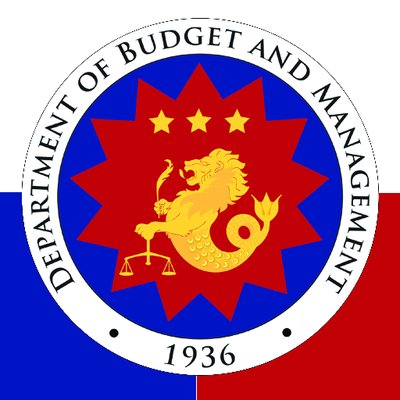
- Details
Good morning to all my fellow government officials and employees joining today’s 5th Government Quality Management Program (GQMP) Symposium.
Assalamu alaikum wa Raḥmatullahi wa Barakatuh.
First, I would like to thank the Development Academy of the Philippines, headed by President and CEO Atty. Engelbert C. Caronan Jr., for once again inviting me to deliver a keynote message at this event anchored on the Government Quality Management Program or the GQMP.
As you know, GQMP is a national government program that promotes and enhances quality improvement in the public sector. One of its components features institutionalizing the Service Quality Standards, assuring consistency in the quality of public services. Designed to steer the bureaucracy towards more citizen-centric service delivery, the program puts citizens at the heart of public institutions while instilling a quality culture.
Tulad po ng sinabi ko sa katatapos lamang na 2023 Public Sector Quality and Productivity Improvement Forum—kung sa private sector po ay mayroon tayong tinatawag na customer service, tayo rin po sa gobyerno ay may pinagsisilbihan, at ‘yan ay ang ating mga kababayan. After all, the government exists for and because of the people. This means that, as public servants, our fellow citizens are our clients.
While we are already committed to delivering standardized and high-quality services to the citizens—which is why we are gathered here today—allow me to nevertheless highlight how we can achieve this especially by listening.
Let's take a look at your theme: “Translating Insights from Clients to Standardize Service Experience”.
As the theme suggests, understanding the client’s context is vital in driving the standardization of their service experiences. This is a very good continuation of last year’s theme, “Towards Quality Service for all Citizens” because it espouses the call to actively listen to our clients or our constituents to be able to provide them with quality services that truly respond to their needs.
Likewise, obtaining and utilizing research-based and citizen-centric information in developing and delivering government services—one of the topics to be discussed today—will not be possible without actively listening to the citizens.
Surely, services crafted through active citizen engagement will be more accepted and supported by the people.
Indeed, effective and responsive public services, created and implemented by listening to the voices of the people, should be standardized, enhanced, improved and even institutionalized.
A very notable example of this is the GQMP, which capacitated 990 key officers and staff of Public Sector Organizations in 2022 alone; provided technical assistance to 111 agencies as of December 2022; and certified 200 agencies under the ISO 9001:2015 Standard Quality Management System as of April 2023.
At the Department of Budget and Management, we also make sure to actively listen to our kababayans, and so we are also working hard to contribute to the improved productivity and public service delivery of the bureaucracy through the Fiscal Year 2024 National Budget, as well as through structural reforms such as the proposed amendments to the Government Procurement Reform Act, the continuation of the initiatives of the Philippine Open Government Partnership, and the DBM’s digital transformation roadmap.
As such, I call on each of you to listen and learn from today’s discussions. Most of all, learn to listen to our fellow Filipinos. Dahil ang pagpapabuti ng ating mga programa, sistema, gobyerno, bansa, at maski na ng ating mga sarili ay nagsisimula sa pakikinig. At sa ating pakikinig, matutugunan natin ang tunay na mga pangangailangan ng ating mga kababayan tungo sa Bagong Pilipinas.
Thank you very much. Wabillahi Tawfiq Wal Hidaya, Wasalamu alaikum wa rahmatullahi wa Barakatuhu.
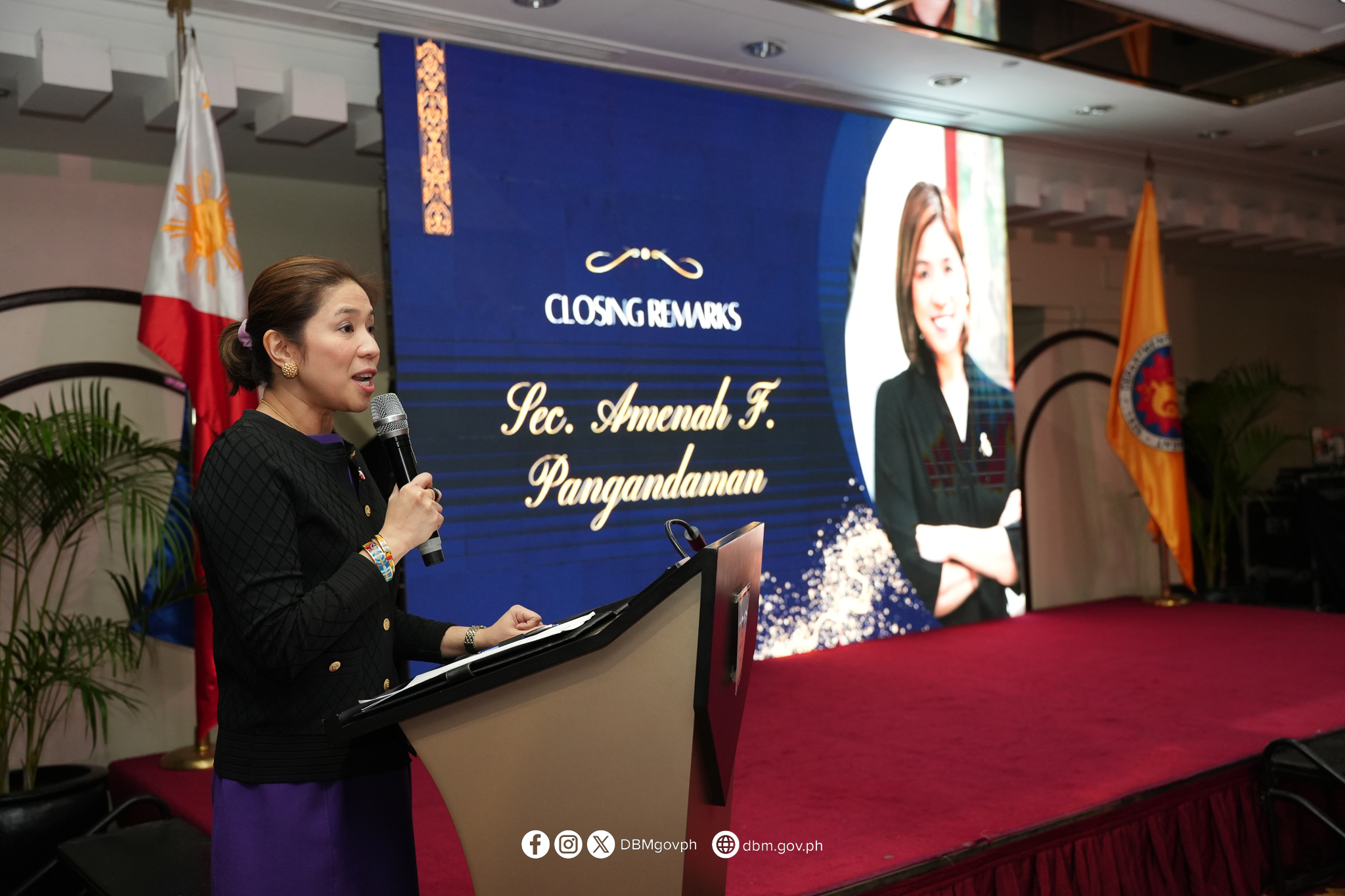
- Details

A pleasant afternoon to everyone joining us in this celebration of passion and dedication.
Assalamu alaikum wa Raḥmatullahi wa Barakatuh.
First, I would like to extend my sincerest congratulations to our awardees. It truly warms my heart to know that the Public Financial Management (PFM) Competency Program is run by very able and passionate individuals. While you come from different backgrounds, you are bound by a common purpose: to promote a strong PFM system in the country resulting in better management of our public resources in order to ultimately uplift the quality of life of our fellow Filipinos.
As Budget Secretary, I have been dedicated to institutionalizing budget reforms and enhancing our PFM initiatives. I firmly believe that a strengthened PFM is our country's springboard to success. It is definitely a key to attaining our Medium-Term Fiscal Framework or MTFF goals and achieving our Agenda for Prosperity.
Personally, I have been exposed to PFM throughout my twenty years of public service. Being in the DBM—the Executive, the Legislature when I was in the Senate, and even Bangko Sentral ng Pilipinas, nasaksihan ko at natutunan ko kung gaano kahalaga ang PFM sa pagpapatakbo ng gobyerno, sa pamamalakad ng pamahalaan. Hence, I cannot stress enough how instrumental PFM is.
Bukod sa akin, alam ko naman na ang bawat isa po sa inyo rito ay may sari-sariling kuwento—mayroon po diyan sa mga trainor, marahil ‘yung mga tinatawag natin na shy-type noong nagsimula pero kalaunan ay very confident na, o kaya naman ay nahatak o napakiusapan lang na sumama pero ngayon ay naghahatak o nag-iimbita na ng mga kasama sa ating competency program, o ‘yung mga mayroong trainees-turned-colleagues dahil ‘yung dating tinuruan nila ay ngayon nagtuturo na rin sa PFMCP.
Whatever your story may be, today, we celebrate you and your stories. To the pillars of PFMCP, thank you for your leadership and guidance especially during the program’s inception. To our PFM champions, thank you for embodying what being a PFM practitioner truly means. To our pioneer subject-matter experts, thank you for generously sharing your knowledge and time. To our PFMCP mentors, thank you for helping us improve how we deliver the program. To our PFMCP partners, salamat sa relentless support. To our PFMCP speakers, thank you for lending your voice. And, to the PFMCP Team, thank you for making all of this possible.
Sa lahat po ng bumubuo ng PFMCP, taos-puso po akong nagpapasalamat at sumasaludo sa inyo. Kayo po ang dahilan kung bakit nadala na natin ang PFMCP sa iba’t ibang panig ng bansa—mula sa Region I hanggang sa BARMM. Sana po ay patuloy ninyo kaming samahan at suportahan na pag-igihin at pagandahin pa natin lalo ang ating PFM practice sa bansa. At makakaasa po kayong patuloy din ang Department of Budget and Management sa pagsusulong ng mga programang tulad nito.
To end, allow me to quote former U.S. President John F. Kennedy: “Each time a man stands up for an ideal or acts to improve the lot of others…he sends forth a ripple of hope.” Relatedly, I believe that each of us in this room, who willingly shares their skills and heart in forwarding the cause of this program, is a force that creates ripples of change. And I am confident that, collectively, these ripples will become waves of transformational change for the nation and our fellow Filipinos, tungo po sa Bagong Pilipinas.
Maraming salamat po. Mabuhay po kayo! To Usec. Luz [Cantor], thank you po, salamat po at dumating po kayo.
Wabillahi Tawfiq Wal Hidaya, Wasalamu alaikum wa rahmatullahi wa Barakatuhu.
